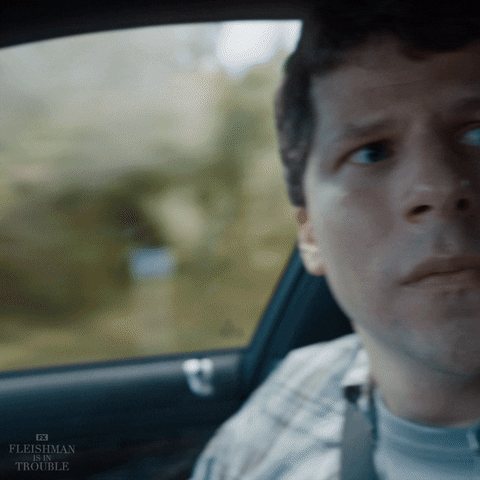Getting married, owning a lovely house, having two kids, doing what you love, and earning more than you need. For a long time, this has been sold as the recipe for happiness.
We are constantly looking for our “happy ever after,” but one of the problems with "happy ever after” is that it is static. It's a high ceiling, the end of the movie, and you cannot get anywhere from there. Even if we get all of those success markers supposed to make us content (which is not easy, to begin with), we still feel like it's never enough.
The relentless pursuit of improving ourselves and our lives, and the pressure to gain more and more, move us in the opposite direction from being content with our happy endings.
This dissatisfaction when you have it all is just one of the many topics the FX series Fleishman Is in Trouble discusses. Based on the novel of the same name and adapted to television by Taffy Brodesser-Akner herself, she dissects the divisions of domestic labor, the lies about marriage, the damage done by the “happy ever after” myth, the melancholy of being 40, and the truths about motherhood.
Aware that we are constantly unhappy with our lives, she explores the misery that arises from it through her well-rounded characters. The married want to be single, and the single want to get married. Being single and on Tinder is not as enjoyable as one would expect, and being too successful leads to breakdowns. Money never seems to be enough, with the characters planted on the Upper East Side of Manhattan, where a second home in the Hamptons is given and a doctor’s salary of $300,000 is not enough. In this Manhattan, the “money is everything” mantra is no longer a shocking slogan but an embedded philosophy.
What is it about?
In this eight-episode series, we follow Toby Fleishman (Jesse Eisenberg), a successful hepatologist in New York. He had a great job, two kids, and a beautiful wife. After a tumultuous divorce, his ex-wife, Rachel (Claire Danes), disappeared, leaving him to care for their children alone.
We follow his life and divorce closely, wondering what happened to Rachel. However, surprisingly, it's not a male voice narrating the story. It's one of Toby's best friends, Libby (Lizzy Caplan). This seems at first like a weird choice since the main character is clearly Toby Fleishman and most of the episodes are centered around him and his memories and feelings.
But as the series unfolds, we soon learn that Libby is struggling with her own marriage. Through her friend Toby, and his newfound divorce life, she is considering the possibility of a divorce as well. She feels trapped. She cannot do whatever her heart desires, as she did when she was young. She craves to feel like she did when there were so many options available to her.
Through her friend’s divorce story, she processes her own midlife crises. How she lost her identity to become a suburban mom, how she misses her college friends, how challenging it is to navigate marriage, to understand what is going on with our partners, and especially how difficult and sometimes even traumatic it can be to become a mom.
Should I watch it?
Definitely.
I started this newsletter because friends and family always asked for recommendations. So doing it here for more people felt easy to do. When I watched this series, I thought, "This is exactly why I'm doing my newsletter."
Fleishman Is in Trouble is a series I hadn't heard of before. It's completely lost in Disney+'s huge catalog (or Hulu if you are in the US), and it's pretty damn good. It has a lot of talented actors (Claire Danes 🩷 ), it's based on a book and adapted by the writer herself (giving it a bookish feel), and it dives into many topics around our present human existence that are not always on popular TV shows.
Although the series sounds like rich white people complaining, it is self-conscious in this regard. It doesn't shy away from the fact that these characters are oppressively rich and never content. It talks about money in a meaningful way, and the struggles the characters face are broader and more relatable. Everyone can feel or has experienced regret, anxiety, and existential dread like the characters.
I didn't find the series annoying or alienating in this sense. It's a well-developed story about how we sometimes follow the traditional path of marrying, having children, making money, and buying a house, only to find out that it is not what we really want. It doesn't bring joy by itself.
It is about dealing with our choices and making the most of them. And how sometimes we need our particular breakdowns and existential dread to change for the better.
Here is the trailer, if you want to see it:
Although I would love to have more paid subscribers, I know becoming one is not for everyone. If you prefer to support and keep Read, Watch, Binge running with a one-time donation, consider buying me a coffee.
Read some of my top posts:
All we want is to connect
(This article contains spoilers for the show Beef) Have you ever pretended to be something you are not to be loved and have friends? Did you pretend to like some music or movie, or even change how you think to fit in? I know you have because we were all teenagers at some point. What I remember most about being a teenager, in general, was wanting to fit in…












i scrolled through this post quickly because i was afraid of spoilers but your opening paragraphs had me wanting to watch this!
I’m excited to dig into your article. I enjoyed the show and have been meaning to rewatch it with my spouse, who has had her struggles with postpartum depression. A lot resonated with me.